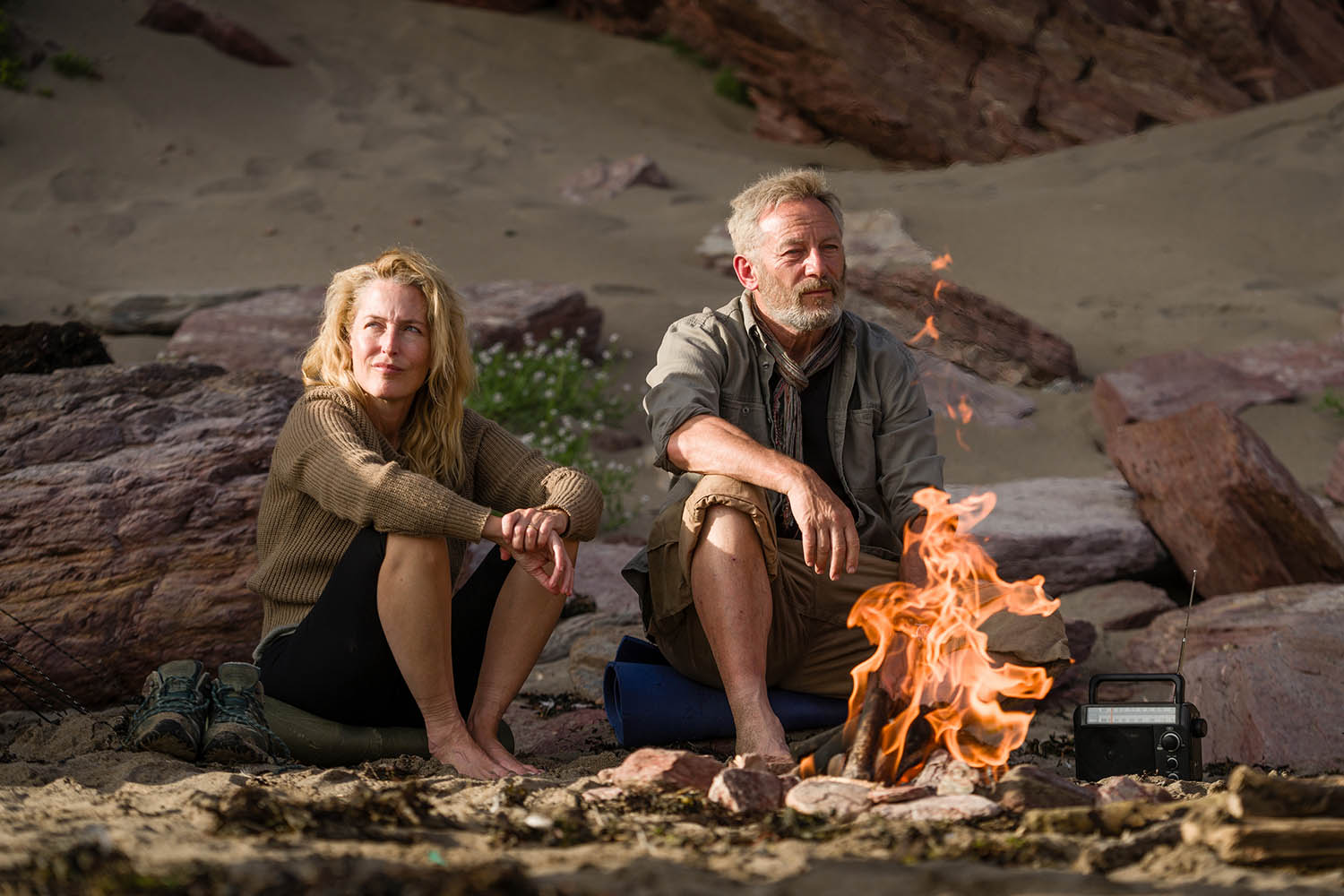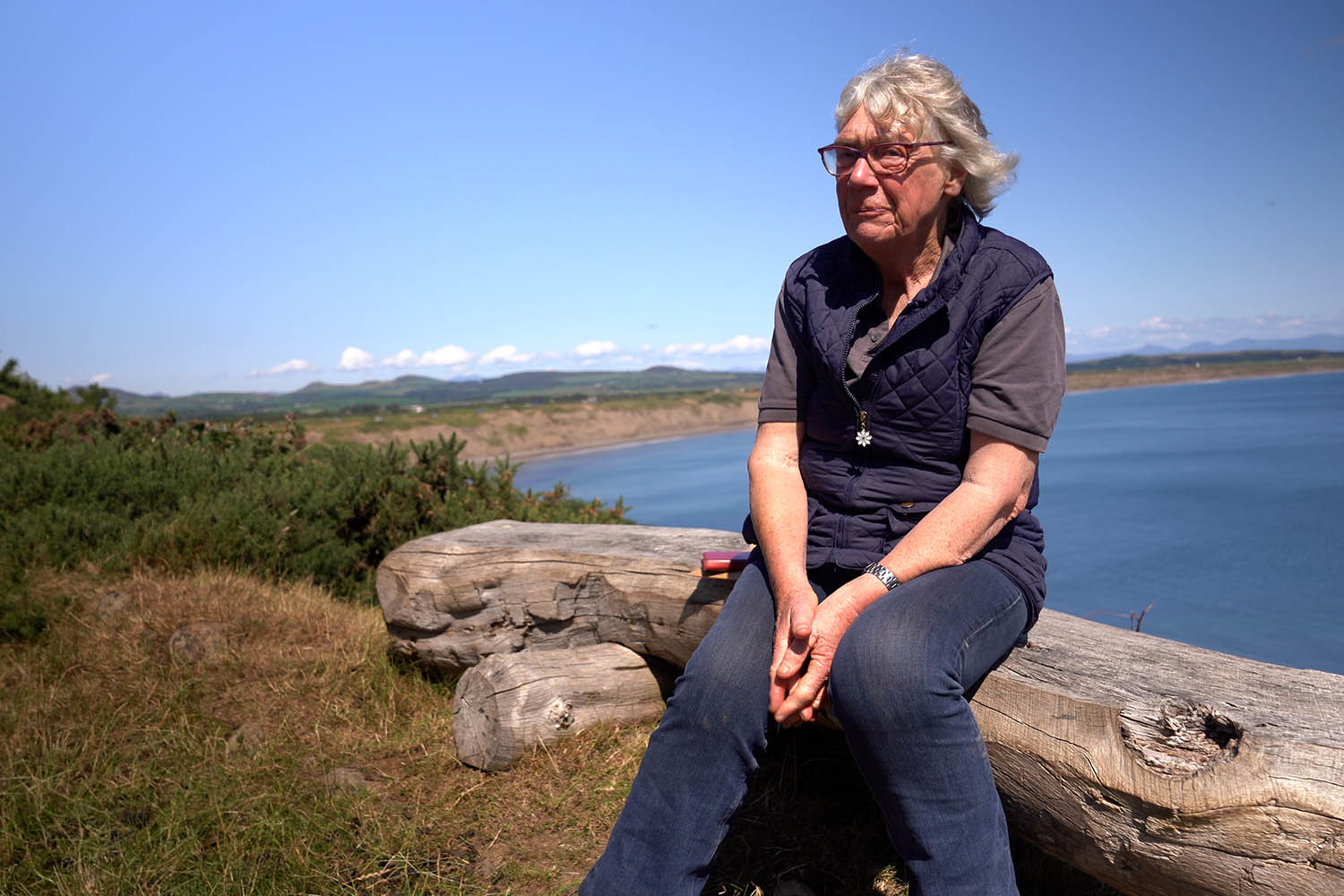When I first call Ros Hemmings, I expect her to be surprised. A widow in her 60s living in rural North Wales, she has never received a call from an investigative journalist in London. But instead she tells me: “Oh no, I have a very good idea why you are ringing.” She has been waiting for this call for years.
Hemmings rightly suspected that I wanted to ask her about a woman she knows as Sally Walker. Millions of people around the world know Sally by a different name: Raynor Winn. She is the author and protagonist of one of the most successful British non-fiction books in recent years. The Salt Path traces Raynor and her husband Moth’s 630-mile journey along the sea-swept South West Coast Path.
A heartbreaking “true” story of two people in their early 50s forced out of their rural home in Wales and weighed down by a sudden diagnosis of Moth’s terminal illness, The Salt Path went straight to the top of the bestseller charts, selling more than 2m copies worldwide since its publication in 2018.
Winn has since written two sequels and has a lucrative publishing deal with Penguin to produce at least one more. Five weeks ago The Salt Path reached new audiences when it was released in the UK as a film, starring Gillian Anderson and Jason Isaacs, and Winn is a co-producer.

Gillian Anderson and Jason Isaacs in The Salt Path
Standing proudly on the red carpet outside the Lighthouse Cinema in Newquay, Raynor, 60, told TV cameras at the film’s UK premiere that the experience was “almost unbelievable”. In that moment, she and Moth seemed like the ultimate examples of British grit and perseverance.
Back in Wales, Hemmings saw a very different picture. Because she knew something about Winn that almost everyone – her publishers, her agents, the film producers – had missed. She knew that Raynor Winn wasn’t her real name and that several aspects of her story were untrue. She also believed she was a thief.
The Observer Daily: the very best of our journalism, reviews and ideas – curated each day.
Sign up for our daily newsletter for free by clicking here.
In The Salt Path, Winn describes in harrowing detail how she and Moth lost their “forever home” – a 17th-century farmhouse deep in the Welsh countryside.
It was a home, Winn writes, where the couple raised their children and one in which they expected to die. But that dream was shattered, the book explains, when a childhood friend of Moth’s – a man they call Cooper – persuaded them to invest in his business.
When Cooper’s company failed, Winn writes, he told the couple they needed to pay up and then took them to court to recoup the debt. The judge ruled that Cooper should take possession of the couple’s house in lieu of the money they owed. “We lost. Lost the case. Lost the house,” Winn tells us.
In other words, according to Winn, the couple lost their home simply because their own generosity was turned against them. Winn has repeated this claim in several interviews, telling one magazine last month that she lost the home “thanks to a bad investment”.
‘In the end, I think it was around £64,000 that Raynor Winn had nicked over the previous few years’
Ros Hemmings, former boss
But this bears little resemblance to what Hemmings remembers. “Her claims that it was all just a business deal that went wrong really upset me,” she says. “When really she had embezzled the money from my husband. It made me feel sick.”
The following account of how the couple lost their home is based on interviews with eight people with direct knowledge of what happened.
In the early 2000s, Hemmings says, Winn was working part-time as a bookkeeper in her husband’s family-run business: an estate agency and property surveyor in Pwllheli, in north Wales. At that time, Winn was known by her legal name: Sally Walker. Her husband, Moth, is really Tim Walker.
A few years after Sally Walker started working there, Hemmings says, her husband, Martin, started to notice that money had gone missing. Hemmings says that one day in 2008 Martin looked at the company bank balance and realised that Walker had failed to deposit a large sum of cash.

Isaacs, left, and Anderson, right, with the Winns, the couple they play in The Salt Path
“So we brought all the books home and started working backwards through them,” Hemmings told me. “There was around £9,000 missing over the previous few months.”
A few days after the discovery, she remembers Walker turning up at her home, offering to pay back the money. “She was sobbing in the yard and said: ‘I’ve even had to sell my mother’s wedding dress to do this,’ ” Hemmings recalls. They realised Walker’s offer might be their only chance to get their money back so, Hemmings says, they allowed Walker to repay the £9,000 and moved on with their lives.
But that’s not where things ended. “We kept looking back [through the accounts],” Hemmings remembers. “In the end, I think it was around £64,000 she’d nicked over the previous few years.”
Once the Hemmings had established that this far larger sum was missing, Martin called the police. A local police officer who worked on the case has confirmed that Martin reported the missing money to him. Hemmings says that Walker was then arrested and taken in for questioning.
Michael Strain, the Hemmings’ solicitor, recalls that Walker was arrested and interviewed by the police. Then Ros says Walker was sent home for the night and told to appear at the police station the next day.
“But the next morning, she never showed up. She had vanished.”
***
Rebecca remembers clearly the day in 2008 when her husband, James, told her Sally Walker had come from Wales to London to see them.
A life coach in her 60s, Rebecca says: “ [Walker] told him she was on the run from the police because her employer had found out she had been taking money and was going to prosecute her criminally.”
Rebecca asked me not to use her and her husband’s real names. James, who died in 2016, was a distant relative of Tim Walker’s. “He said: ‘No relative of mine is going to prison.’”
James arranged a deal under which he would lend Walker the money to repay the sum she had allegedly stolen, Rebecca says. He also got her a good solicitor.
Back in Wales, Hemmings recalls how her husband Martin was contacted by “some fancy London solicitor” who told them Walker would pay all the missing money and would cover legal costs on both sides if – and only if – Martin agreed not to pursue a criminal case against her. Martin also had to sign a non-disclosure agreement.

Ros Hemmings. She says Winn’s depiction of events in The Salt Path made her feel sick
Hemmings remembers how deeply her husband was affected by the episode. “It absolutely destroyed him because he was a very trusting, kind person,” she says.
Former staff described Martin, who died in 2012, as a cheerful, warm and generous character.
Martin eventually agreed to Walker’s proposal and drew a line under the whole affair. The police did not pursue any charges against Walker over the alleged theft. “ I just hoped I would never hear from her again,” says Hemmings. “Until somebody waved that book at me and said: ‘Guess who?’ ”
In total, Sally and Tim Walker borrowed £100,000 from Rebecca’s husband James. Documents filed at the Land Registry show the loan from Tim Walker’s relative was secured against the Walkers’ house with a substantial annual interest rate of 18% “payable on demand”. These were tough terms from a relative, but the Walkers were desperate.
Months later, James’s business went bust and in 2010 his loan to the Walkers was transferred to two men he owed money to. The men called in the Walkers’ loan and, when they didn’t pay, took them to court in 2012. During the case James filed a witness statement in which he told the court that “the purpose of the loan is clear: it was required to settle a criminal allegation made against Mrs Walker”.
The court ruled that the Walkers had to repay the debt – which with interest now exceeded £150,000. If they failed to do so within one year, the new creditors could repossess their home.
The Walkers, who were both out of work, had little hope of finding the money. But they came up with an extraordinary plan. Less than two months after the judgment, Sally and Tim started their own company, Gangani Publishing. It only ever published one novel, How Not to Dal dy Dir (Stand Firm), written by an unknown writer called Izzy Wyn-Thomas.
Readers were encouraged to purchase the novel directly from Gangani’s website, which is no longer active. And the Walkers offered an intriguing enticement. For every copy bought, purchasers would be entered into a free prize draw with a chance to win the Walkers’ home in Wales – the same property that a judge had ordered to be repossessed if they didn’t sell it.
In the prize draw’s terms and conditions, the Walkers said the house was being “offered free of mortgage or any other legal or registered charge”. In fact, at this point the couple had a mortgage of £230,000 in addition to the loan to James. The house was worth less than these sums combined.
It isn’t known what happened to the money raised from this enterprise or whether the Walkers returned the proceeds after their house was finally repossessed in June 2013.
The Observer contacted Sally and Tim Walker, putting all the information we had gathered to them. They didn’t speak to us – instead Sally sent a short statement through her lawyers. “The Salt Path,” the statement says, “lays bare the physical and spiritual journey Moth and I shared, an experience that transformed us completely and altered the course of our lives. This is the true story of our journey.”
No one has argued that Raynor Winn and Moth didn’t go on a physical and spiritual journey. There’s truth in The Salt Path. But there’s truth outside it as well, as our reporting has found. How much does it matter if the interior and exterior don’t line up?
For many fans, The Salt Path’s depiction of a generous England, whose coastline is filled with beauty and people who open their hearts to a couple in need, will continue to resonate even after the revelations in this article.
For these fans, the meaning of Winn’s story will lie less in the details than in its message. And, they might say, fact and fable are often jumbled up to some degree in everyone’s life.
But what about those whose hearts went out to the couple because they were good people who had been conned by a friend and then laid low by Moth’s diagnosis?
For them, Sally Walker’s alleged theft and apparently deliberate failure to reveal details of a serious criminal allegation will go well beyond the forgivable omissions you might find in a memoir. The misrepresentation will represent significant evidence of bad character.
At the time of publication, Penguin’s website still describes The Salt Path as “unflinchingly honest” and “true”. Publishers of non-fiction books previously found to contain fabrications have been forced to apologise and even issue refunds.
When James Frey’s supposedly true account of his drug addiction, A Million Little Pieces, was discredited in 2006, a group of readers sued the publisher Random House.
I contacted Penguin with a full account of my findings but it did not respond. I also contacted Walker’s literary agent, Graham Maw Christie, and Number 9 Films, which produced The Salt Path movie. They did not respond either.

The house in North Wales that Winn said was repossessed, forcing the couple to ‘wild camp’ in the UK
After speaking to Hemmings and Rebecca, I wanted to know if there were other aspects of The Salt Path that didn’t add up. So last month I made the five-and-a-half-hour journey from London to north Wales to speak to those who knew Tim and Sally Walker before they found fame under their new names.
To reach the Walkers’ old house, one has to drive down a narrow mud path between two fields flanked by tall grass and wildflowers. A dilapidated stone piggery with a partially collapsed slate roof sits next to a large barn converted into a modern Airbnb rental. Beside these is a small cottage that dates back to the 17th century.
In 2016, three years after Winn and Moth lost that home, it was bought by Maxine Farrimond, a cheerful woman in her 60s with long white hair, who invited me in for tea.
As soon as Farrimond moved in, she told me, she was shocked to receive a stream of letters addressed to Sally and Tim Walker: unpaid bills, credit cards and a speeding fine as well as letters from debt collection agencies.
Public records show that there were at least five county court judgments against the Walkers from 2011-14, the last of which comes four years before the publication of The Salt Path. After so many years it’s difficult to see what the summonses were for. But they are probably related to missed payments for overdrafts, credit cards or similar debts.
When I asked about the couple around Pwllheli, the coastal town 5 miles south of the Walkers’ home, the owner of the garage told me that Sally still owed him money. “Nearly £800,” he said.
In the small arts centre The Salt Path movie is showing. The garage owner was astonished to learn that the woman played by Gillian Anderson was the same one he’d done business with.
‘I’d be very sceptical that it is corticobasal with Moth. I’ve never looked after anyone that’s lived that long’
Prof Michele Hu
“If you see them, can you tell them to pay me?” he said. “I think they can afford it now.”
Back at the house, Farrimond had been receiving a different sort of letter in the Walkers’ names. These were in French – one for a TV licence payment, another for council tax and a third demanding a residence tax – the sort of letters that are usually only sent to the owner of a property.
French government documents I’ve seen show that in 2007 the Walkers did indeed buy an old stone house – in the south-west of France, an hour-and-a-half from Bordeaux. The documents show that the couple still own the house.
When I visited Le Village du Dropt last week, it was clear that the property – a stone house and pigeon tower at the edge of a village – had been in an uninhabitable state for a while. Local officials said the Walkers still owed taxes on the property. Villagers told me that the Walkers never stayed in the house but they used to visit and stay in caravans on their land.
In The Salt Path, Winn writes that after the couple’s house in Wales was repossessed, they had nowhere to go and no other options apart from to “wild camp” in the UK. In fact, they owned land in France on which they had previously stayed.
Moth’s debilitating illness is at the very heart of the story in The Salt Path. Winn tells us that he received his diagnosis in 2013, a few days after they learned that their house would be repossessed. A consultant explains to the couple that Moth has corticobasal degeneration (CBD), a relatively rare neurological condition in the same family as Parkinson’s disease.
Sufferers often experience tremors or lose control of their arms or legs; many have difficulty speaking and may eventually suffer dementia. The damage to the brain caused by this condition is devastating and irreversible, and there is currently no treatment.
Life expectancy for CBD sufferers is often tragically short: six to eight years from diagnosis is typical. Many patients suffer debilitating symptoms significantly before that, often ending in the need for around-the-clock care. In Tim Walker’s case, he has been living with the condition for 18 years and he seems to have no visibly acute symptoms.
I’ve spoken to nine neurologists and researchers specialising in CBD – and when the history of Moth’s condition, as set out in Winn’s books and by the couple in interviews, was described to them, they were sceptical about the length of time he has had it, his lack of acute symptoms and his apparent ability to reverse them.
Each of Winn’s three books has a similar structure: they all start with Moth suffering from the symptoms of CBD. The couple then embarks on a challenging walk of hundreds of miles over several months, carrying their belongings and tent on their backs. By the end of the walk Moth’s symptoms have abated and he seems much better.
The last of Winn’s three books, Landlines, goes a step further. In the first few chapters, Moth’s condition seems far worse than it has ever been and a brain scan shows “a distinct reduction in his receptor cells”. But at the end, of another long walk a subsequent brain scan shows “a normal reading”. The CBD seems to have disappeared.
Winn acknowledges that Moth’s recovery seems miraculous. “We do know that neuroplasticity exists, although we know very little about it,” she writes. “We used to think the Earth was flat. We used to think no universe existed beyond our own.”
Prof Michele Hu is a consultant neurologist and professor of clinical neurosciences at Oxford University. She says Moth’s presentation of CBD does not tally with anything she has seen in her clinical practice.
“I would be very sceptical that it is corticobasal. I’ve never looked after anyone that’s lived that long,” she told me. Another neurologist said that Moth’s history with CBD “does not pass the sniff test”.
The Observer contacted the PSPA, the only UK charity dedicated to people affected by CBD, and put all our findings to them as well as the concerns of the specialists we have spoken to. In the past Tim Walker has been a public advocate for the charity and it had produced a video of him talking about his condition which was available on their website. The PSPA declined to give us a comment but the charity has now removed Tim’s video.
People have the right to keep their medical history private, and Tim has chosen not to provide his to rebut the medical scepticism The Observer put to him. There is nothing I have seen to contradict his diagnosis or Sally Walker’s account of it. And medical miracles do happen.
Back in north Wales, Hemmings says she’s glad her husband didn’t live long enough to see the publication of the book and the release of the film. “ It would have made him so angry,” she says.
Watching Raynor and Moth Winn’s meteoric rise to fame and the national adulation they have garnered, Hemmings feels frustrated, but she has no idea where to go or who to speak with to put the record straight.
Instead she says her daughter would often try to tip people off about them anonymously. “When she found any of the books in charity shops, she would write a little homily in the front about what Sally’s really like.”
Our reporting has found sins of omission and commission in The Salt Path. Leaving stuff out is run-of-the-mill for a memoir, but the sin of commission – inventing important passages of the book – is not.
We are deep enough into the post-truth world to know that if the idea of truth is mis-sold the idea of truth takes a knock, one that can make a small contribution to a huge problem. The power of a true story lies in the fact that it’s true: it promises to tell the reader something real about what it is to be human and what’s possible.
Raynor Winn’s publisher says her story is “unflinchingly honest”. It’s not. The story, no doubt, has elements of truth, but it also misrepresents who they were, how they started out on their journey and the financial circumstances that provided the backdrop.
And people don’t just read and watch The Salt Path, they act on it; people with hopes and health problems, setting off believing that they’re following a true path. The consequences of that may mostly be trivial but there’s the potential, too, for real harm.
With additional reporting by Helen Clifton, Leonie Thomas, Killian Kéruzoré and Pierre Reibel
Illustration by Observer design with acknowledgements to illustrator Angela Harding/Penguin
Photographs by Jon Hall/Saltbeef; Black Bear/Steve Tanner; Alamy; Alice Anderson
.png)




